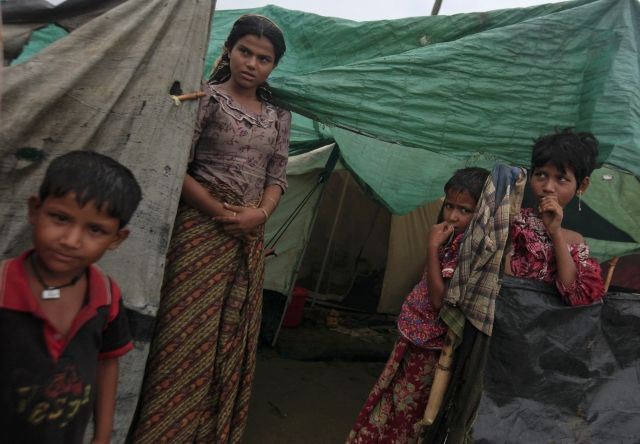Myanmar Imposes 2-Child Limit For Rohingya Muslims In Rakhine

Authorities in Myanmar’s conflict-ridden Rakhine state imposed a two-child policy for Rohingya Muslim families on Saturday, even as the government faces accusations of ethnic cleansing against the Muslim minority.
The new measure would be applied to two Rakhine townships -- Buthidaung and Maundaw -- that border on Bangladesh, where 95 percent of the population is Muslim, AP reported.
The ruling, which the authorities say is meant to stem rapid population growth among the Rohingya Muslims, does not apply to the region’s Buddhists.
The country’s longtime pro-democracy champion, Aung San Suu Kyi, condemned the policy Monday, Reuters reported.
The two-child policy dates back to 1994, but it does not appear to have been enforced until recent weeks.
"They shouldn't discriminate. This is against human rights," Suu Kyi told journalists.
The authorities did not say how the new ruling, which includes a ban on polygamy, will be enforced. The policy will not apply yet to other parts of Rakhine state, which have smaller Muslim populations.
Buddhists comprise 89 percent of Myanmar's population while Muslims represent 4 percent, according to U.S. government data.
The ruling came a month after Human Rights Watch accused Burmese officials, community leaders and Buddhist monks of committing “crimes against humanity in a campaign of ethnic cleansing against Rohingya Muslims” in the state of Rakhine since June 2012.
Under international law, crimes against humanity are those "committed as part of a widespread or systematic attack by a government or organization on a civilian population. Among the crimes against humanity committed against the Rohingya since June are murder, deportation and forcible transfer of the population, and persecution," according to the HRW.
Rakhine state spokesman Win Myaing said a government-appointed commission found last week that overpopulation of Muslims was one of the reasons of tension between Muslims and Buddhists, adding that the population growth rate of Rohingya Muslims was 10 times higher than that of the Rakhine Buddhists, AP reported.
The two-child policy measure was put in place after the commission recommended family planning programs to curb population growth among Muslims, Win Myaing said. The commission also recommended that security forces in the region be doubled, AP reported.
The persecution of the Rohingya has its roots in the 1982 Citizenship Law, which denies Burmese citizenship to Rohingya on ethnic grounds, according to the HRW.
The law does not recognize the Rohingya people as one of the eight “national races,” thus denying the Rohingya full citizenship, and instead, requires them to produce “conclusive evidence” that they settled in the country before independence in 1948, a difficult task for most Rohingya families.
For more than 30 years, Myanmar’s neighbor China has upheld a strict one-child policy, which continues to be brutally enforced with hefty fines, and forced sterilizations and abortions. But China’s policy grants favorable exemptions to minority ethnic groups, the opposite of the Burmese plan.
© Copyright IBTimes 2024. All rights reserved.






















